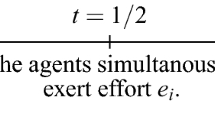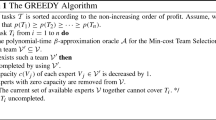Abstract
Team formation is ubiquitous in many sectors: education, labor markets, sports, etc. A team’s success depends on its members’ latent types, which are not directly observable but can be (partially) inferred from past performances. From the viewpoint of a principal trying to select teams, this leads to a natural exploration-exploitation trade-off: retain successful teams that are discovered early, or reassign agents to learn more about their types? We study a natural model for online team formation, where a principal repeatedly partitions a group of agents into teams. Agents have binary latent types, each team comprises two members, and a team’s performance is a symmetric function of its members’ types. Over multiple rounds, the principal selects matchings over agents and incurs regret equal to the deficit in the number of successful teams versus the optimal matching for the given function. Our work provides a complete characterization of the regret landscape for all symmetric functions of two binary inputs. In particular, we develop team-selection policies that, despite being agnostic of model parameters, achieve optimal or near-optimal regret against an adaptive adversary.
Extended version with proofs can be found at https://arxiv.org/abs/2210.05795.
Access this chapter
Tax calculation will be finalised at checkout
Purchases are for personal use only
Similar content being viewed by others
Notes
- 1.
Except in the last round, where known (0, 0)-teams may be played; however, no (1, 1)-teams are played in this round.
References
Aigner, M.: Turán’s graph theorem. Am. Math. Mon. 102(9), 808–816 (1995)
Babaioff, M., Feldman, M., Nisan, N.: Combinatorial agency. In: Proceedings of 7th ACM Conference on Electronic Commerce, pp. 18–28 (2006)
Carlier, G., Ekeland, I.: Matching for teams. Econ. Theory 42, 397–418 (2010)
Cesa-Bianchi, N., Lugosi, G.: Combinatorial bandits. J. Comput. Syst. Sci. 78(5), 1404–1422 (2012)
Chen, W., Wang, Y., Yuan, Y.: General framework and applications. In: ICML, Combinatorial Multi-armed Bandit (2013)
Combes, R., Sadegh Talebi, M., Proutiere, A., Lelarge, M.: Combinatorial bandits revisited. In: Proceedings of 29th Advances in Neural Information Processing Systems, pp. 2116–2124 (2015)
Devanur, N.R., Jain, K.: Online matching with concave returns. In: Proceedings of the Forty-Fourth Annual ACM Symposium on Theory of Computing, pp. 137–144 (2012)
Gai, Y., Krishnamachari, B., Jain, R.: Combinatorial network optimization with unknown variables: multi-armed bandits with linear rewards and individual observations. IEEE/ACM Trans. Networking 20(5), 1466–1478 (2012)
Gopalan, A., Mannor, S., Mansour, Y.: Thompson sampling for complex online problems. In: International Conference on Machine Learning, pp. 100–108. PMLR (2014)
Han, Y., Wang, Y., Chen, X.: Adversarial combinatorial bandits with general non-linear reward functions. In: International Conference on Machine Learning, pp. 4030–4039 (2021)
Hssaine, C., Banerjee, S.: Information signal design for incentivizing team formation. In: Proceedings of 14th Conference on Web and Internet Economics (WINE) (2018)
Johari, R., Kamble, V., Krishnaswamy, A.K., Li, H.: Exploration vs. exploitation in team formation. In: Proceedings of 14th Conference on Web and Internet Economics (WINE) (2018)
Katariya, S., Kveton, B., Szepesvari, C., Vernade, C., Wen, Z.: Stochastic rank-1 bandits. In: Artificial Intelligence and Statistics, pp. 392–401. PMLR (2017)
Kirschner, J., Lattimore, T., Krause, A.: Information directed sampling for linear partial monitoring. In: Conference on Learning Theory, pp. 2328–2369. PMLR (2020)
Kleinberg, J., Raghu, M.: Team performance with test scores. In: Proceedings of 16th ACM Conference on Economics and Computation (2015)
Branislav Kveton, Zheng Wen, Azin Ashkan, and Csaba Szepesvári. Tight regret bounds for stochastic combinatorial semi-bandits. In Proc. 18th Intl. Conf. on Artificial Intelligence and Statistics, 2015
Merlis, N., Mannor, S.: Tight lower bounds for combinatorial multi-armed bandits. In: Conference on Learning Theory, pp. 2830–2857. PMLR (2020)
Rajkumar, A., Mukherjee, K., Tulabandhula, T.: Learning to partition using score based compatibilities. In: Proceedings of 16th International Conference on Autonomous Agents and Multiagent Systems, pp. 574–582 (2017)
Russo, D., Van Roy, B.: Learning to optimize via information-directed sampling. Advances in Neural Information Processing Systems, 27 (2014)
Sentenac, F., Yi, J., Calauzenes, C., Perchet, V., Vojnovic, M.: Pure exploration and regret minimization in matching bandits. In: ICML21, pp. 9434–9442 (2021)
Singla, A., Horvitz, E., Kohli, P., Krause, A.: Learning to hire teams. In: Third AAAI Conference on Human Computation and Crowdsourcing (2015)
Turán, P.: Egy gráfelméleti szélsoértékfeladatról (on an extremal problem in graph theory). Mat. Fiz. Lapok 48(3), 436–453 (1941)
Wang, S., Chen, W.: Thompson sampling for combinatorial semi-bandits. In: International Conference on Machine Learning, pp. 5114–5122. PMLR (2018)
Zimmert, J., Seldin, Y.: Factored bandits. Advances in Neural Information Processing Systems 31 (2018)
Acknowledgments
We would like to thank anonymous reviewers for useful feedback. Part of the work was done when SB and ME were visiting the Simons Institute for the Theory of Computing for the semester on Data-Driven Decision Processes; they also acknowledge support from the NSF under grants ECCS-1847393 and CNS-195599, and the ARO MURI grant W911NF1910217. DK acknowledges support from ARO MURI grant ARO W911NF1810208.
Author information
Authors and Affiliations
Corresponding author
Editor information
Editors and Affiliations
Rights and permissions
Copyright information
© 2022 The Author(s), under exclusive license to Springer Nature Switzerland AG
About this paper
Cite this paper
Eichhorn, M., Banerjee, S., Kempe, D. (2022). Online Team Formation Under Different Synergies. In: Hansen, K.A., Liu, T.X., Malekian, A. (eds) Web and Internet Economics. WINE 2022. Lecture Notes in Computer Science, vol 13778. Springer, Cham. https://doi.org/10.1007/978-3-031-22832-2_5
Download citation
DOI: https://doi.org/10.1007/978-3-031-22832-2_5
Published:
Publisher Name: Springer, Cham
Print ISBN: 978-3-031-22831-5
Online ISBN: 978-3-031-22832-2
eBook Packages: Computer ScienceComputer Science (R0)




